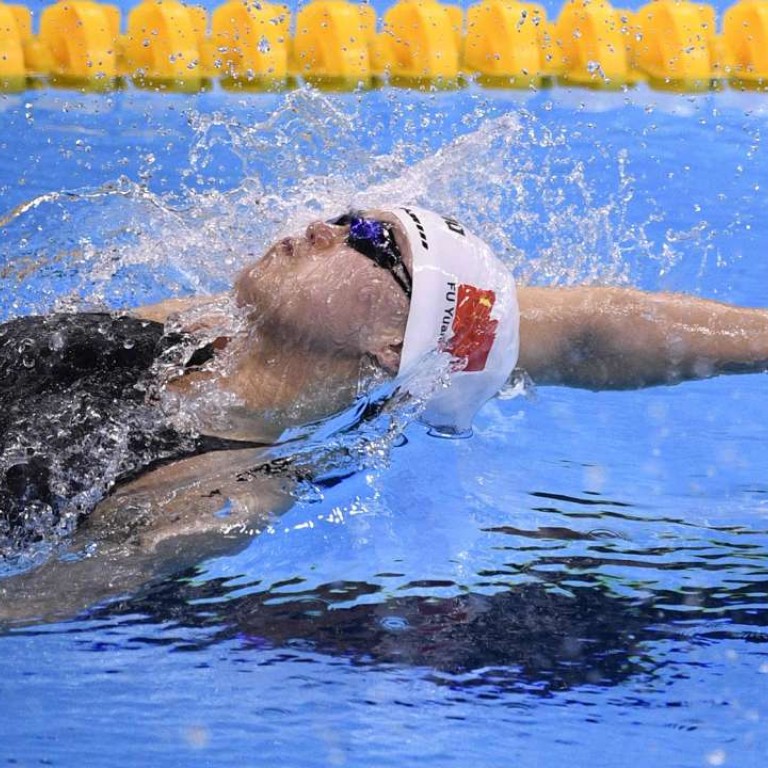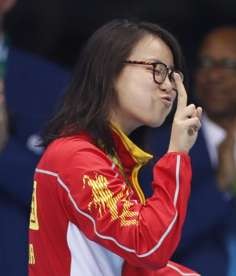
Can China’s adorably awkward Olympic darling Fu Yuanhui turn fame into fortune?
Swimmer Fu Yuanhui’s surprised expression at her bronze win made her an overnight sensation.
China’s latest Olympic sweetheart Fu Yuanhui has shot to fame for her funny facial expressions and cute personality, but will the backstroke swimmer be able to turn her newfound fame into fortune?
While the Hangzhou 20-year-old will no doubt still be swimming for many years to come, it is no secret that many Chinese athletes retire at a young age and often struggle to make ends meet after hanging up their swimsuits.
WATCH: golden moments on Day 5 at Rio Olympics

“God knows what I have been through,” Fu said of her training regime after one race in Rio. “Sometimes I felt that I was about to die. When I was training it really felt like dying.”
While Fu is the first Chinese Olympian to earn a medal in the backstroke, winning bronze on the third day of the Games, it is her hilarious post-race interviews that have engaged millions of new online fans in China and around the world.
After Tuesday’s race, Fu had to be told by a CCTV reporter that she had in fact won bronze. “What?!”
she asked. “I came in third? I didn’t know!”
WATCH: Fu Yuanhui’s livestream Q&A session
WATCH: Fu Yuanhui’s inspirational post-race interview
Chinese athletes are known internationally for being young. The five members of the nation’s women’s gymnastics squad are aged just 16 to 20.
Diving queen Wu Minxia is only 30 years old and has already become the first-ever diver to win five Olympic gold medals.
But she, too, has suffered many injuries and has decided the Rio Games are her last Olympics.
“The injury I sustained this time has hindered my training and competitions, as well as leaving a scar. I am already happy that I can now finally train as normal. However, I knew that the road to recovery would be very tough,” Wu wrote on her Chinese micro-blogging site Weibo in May.
While Wu may not need to worry about her finances after retirement, it is a different story for many other Chinese athletes.
Wu Xiaoxuan was China’s first female Olympic champion, winning a gold medal in shooting at the 1984 Los Angeles Games.
After her retirement, Wu moved to the US in 1991 to live a low-profile life. She ended up working in a hat factory in the US, the state-run China Central Television reported three years ago.
WATCH: relive the action involving Hong Kong athletes on Day 4 and Day 5 at the Rio Olympics
Zhang Shangwu, a former world champion gymnast, was reduced to begging in Beijing’s subway stations after snapping an Achilles tendon in 2002 and retiring three years later.
Because Chinese athletes generally start their sporting careers at a young age, some receive little education and often struggle to find a job when they retire.
China’s General Administration of Sport (GAS) said in 2012 that almost half of retired athletes failed to find employment.
The governing body organises 10 retraining courses a year to help retired athletes learn new skills and find employment.

All national team swimmers must obtain permission from the Swimming Administrative Centre (SAC) before talking to potential sponsors.
“No agreements can be signed by the athletes unilaterally with sponsors or companies,” the policy states.
Chinese swimmer Ning Zetao, who surprisingly did not make it to the 100m freestyle finals in Rio, swam headlong into trouble for not informing SAC before he signed a commercial contract with the Yili milk brand about a year ago.
It was unclear how much the company agreed to pay Ning, but it has been speculated that with his fame and good looks he could earn up to one billion yuan over five years from commercial activities.
Ning eventually sorted out the dispute with the administration and made it to the Rio Olympics.
As for Fu, swimming has become part of her life – but not by design.
“I was quite weak when I was young. I started swimming to get healthier,” she said. “As I started swimming it turned out that I was quite talented, and I have been swimming ever since.
“I used to quite like it but now that it has become my career, I can’t say if I like it or not now. It’s like it has become part of my life,” she told a live social media broadcast in the cheerful and engaging style.
By the way, for those many fans around the world, Fu added that she is now single.

